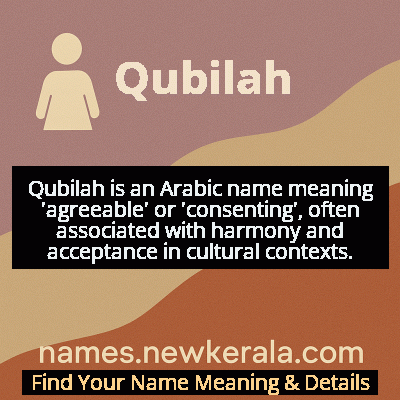Qubilah Name Meaning & Details
Origin, Popularity, Numerology Analysis & Name Meaning of Qubilah
Discover the origin, meaning, and cultural significance of the name QUBILAH. Delve into its historical roots and explore the lasting impact it has had on communities and traditions.
Name
Qubilah
Gender
Female
Origin
Muslim
Lucky Number
7
Meaning of the Name - Qubilah
Qubilah is an Arabic name meaning 'agreeable' or 'consenting', often associated with harmony and acceptance in cultural contexts.
Qubilah - Complete Numerology Analysis
Your Numerology Number
Based on Pythagorean Numerology System
Ruling Planet
Neptune (Ketu)
Positive Nature
Intuitive, analytical, spiritual, and inquisitive.
Negative Traits
Secretive, reserved, aloof, and can be overly critical.
Lucky Colours
Green, yellow.
Lucky Days
Monday.
Lucky Stones
Cat’s eye, moonstone.
Harmony Numbers
1, 5, 6.
Best Suited Professions
Scientists, researchers, spiritual leaders, detectives.
What People Like About You
Depth of knowledge, analytical skills, spirituality.
Famous People Named Qubilah
Qubilah Shabazz
Educator and Activist
Continuing the legacy of civil rights leaders Malcolm X and Betty Shabazz through educational work
Qubilah Bahiyah
Community Leader
Establishing multiple organizations focused on Muslim women's empowerment and community development
Qubilah Al-Mansur
Scholar
Contributing significant research to Islamic studies and Muslim women's historical narratives
Name Variations & International Equivalents
Click on blue names to explore their detailed meanings. Gray names with will be available soon.
Cultural & Historical Significance
Extended Personality Analysis
Women named Qubilah typically exhibit personality traits centered around diplomacy, emotional intelligence, and a natural inclination toward conflict resolution. Their inherent desire for harmony makes them exceptional mediators who can navigate complex social situations with grace and wisdom. Qubilahs often possess a calming presence that puts others at ease, combined with sharp intuitive abilities that help them understand unspoken tensions and underlying concerns. While they prioritize peace, they are not passive—they demonstrate considerable inner fortitude when principles of justice are at stake. Their balanced nature allows them to see multiple perspectives simultaneously, making them valuable advisors and trusted confidantes. Many develop strong communication skills and excel in professions requiring negotiation, counseling, or community leadership. The name's meaning of 'concord' often manifests in their approach to relationships, where they seek to build bridges and foster understanding between diverse individuals and groups.
Modern Usage & Popularity
In contemporary naming practices, Qubilah maintains a distinctive presence within global Muslim communities, appealing to parents who seek names with authentic Islamic roots and profound meanings. While not ranking among the most popular Muslim names, it enjoys consistent usage among families valuing linguistic heritage and spiritual significance. The name has gained increased visibility in Western countries with growing Muslim populations, where it serves as both a cultural marker and a meaningful choice that transcends linguistic barriers. Modern usage patterns indicate that Qubilah is particularly favored by educated, globally-minded Muslim parents who appreciate its unique phonetic quality and the positive values it represents. The name's association with peace and unity resonates strongly in today's interconnected world, making it a compelling choice for families navigating multiple cultural contexts. Recent trends show steady rather than explosive popularity, suggesting Qubilah will likely remain a cherished but distinctive choice within Muslim naming traditions.
Symbolic & Spiritual Meanings
Symbolically, Qubilah represents the profound Islamic concept of unity in diversity and the transformative power of reconciliation. It serves as a living metaphor for the meeting point where different perspectives converge into harmonious understanding, embodying the Quranic ideal that humanity's diversity is meant to foster mutual recognition rather than conflict. The name symbolizes the bridge between apparent opposites—tradition and modernity, individual and community, strength and gentleness. In spiritual terms, Qubilah reflects the soul's journey toward alignment with divine purpose and the harmonious integration of various aspects of human experience. It carries the symbolic weight of the Islamic principle that true peace comes not from the absence of difference but from the respectful engagement with diversity. The name thus becomes not just an identifier but a daily reminder of the higher purpose of human relationships: to reflect the divine attributes of mercy, justice, and compassionate understanding in everyday interactions.

